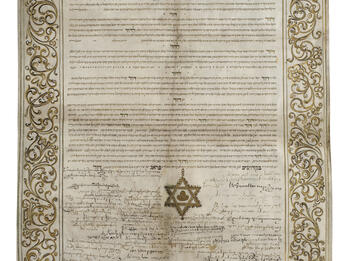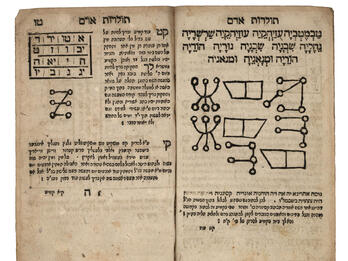Report on Shabbetai Tzvi’s Meeting with the Sultan
At the gate of the inner courtyard, where the eunuchs and all of the great men of the kingdom were standing before the king, they were standing there, and Amira was sitting, and the aforementioned wise men were sitting by his side.
Then Amira said to that wise man, “Do not be sorry and do not be afraid, for everything is in my hands.” Then he took the book of the Zohar and he told him, “Open it to this passage.” He opened it to this chapter, where it is written [II:207b]: “This is similar to a king who was joyous at his own feast and all of the people were joyous along with him. The king saw one man sitting locked up in chains, and ordered that he be freed so that all of those present could participate joyously, etc.”
He said, “This is the meaning of the matter: all of you are like those who are locked up in chains, as you all sit in this place and are fasting. You should break free from the chains for everyone who wants to wear the turban should wear it, and anyone who does not want to wear it should feel free to leave in peace, as he came in.”
Afterwards, Amira asked for water, they brought him some, and he recited the blessings before and after the drink in loud voice and with great intention, in the presence of all of those who stood there. He told all of the wise men that they too should drink and say a blessing.
Afterwards, the Pasha, a respectable officer, came and ordered them to enter, for Vani Effendi had already come. The king sat on the sofa, and all of those who saw the king’s face, and sat the first in the kingdom (Esther 1:14) were standing on his right, on his left, and behind him. Amira had the twenty-four books of the Bible in one hand and a crystal in his other hand, and he stood very close to the king. Vani Effendi sat between him and the king, and the aforementioned wise men were standing behind Amira in the first row.
Then Amira told the king about the dreams and the interpretation of what was to come from the dreams, both on the simple level and on the esoteric level, which may not be written down.
Then the exalted king asked, “And why did these wise men come?”
He told them, “These are the great wise men of Israel, and I brought them here in order to dispute with them, in order that they will enter into this faith. For if these convert, then all of Israel will convert.”
Then the king told Vani Effendi, “Ask them directly why it is that they have come.”
Then Vani Effendi asked them in Arabic, “Why did you come here?”
They answered him and said, “We recognize the fact that this man was a great wise man of the Jewish people, and when he converted and put on the turban, it did not seem to us that there was a reason for this. And now that we see that he is making a great effort to convert other people to this faith, we have asked him why. He has answered that he will prove the matter from our Torah, and he has brought us here and has said that he will prove the matter before the exalted king.”
Then Vani Effendi told all of these things to the king. The king told him, “Go back and ask them directly whether they will convert if he shall prove it to them.”
Then they answered and said, “If he proves it to us and shows us clear evidence from our Torah, we will admit to his truth.” They were busy with these matters for about two hours. Happy is the eye that saw the greatness of the valor when he spoke before the king, and how the king behaved toward Amira, and many other matters such as these, which cannot be written down.
Then the king said to Amira, “Speak with them.”
Amira said to him, “This matter needs to be discussed while sitting down, for this matter requires time and patience, and cannot be accomplished while standing.”
Then the king told them to go to the diwan [governmental conference room]. They then went to the diwan, the place in which the deputy and the ministers sit. The king came and sat in a kafiz [a closet with lattice openings, where the sultan could sit and watch unobserved], and Amira began to ask difficult questions concerning the matter of the divine, such as the meaning of the verses: “And the Lord repented, etc.,” “And it grieved Him, etc.” (Genesis 6:6), and other similar verses, until he came to the difficulty of the verse: “Who is like You among the mighty ones, O Lord?” (Exodus 15:11). And then he read the entire Song of the Sea.
When Amira began to ask his difficult questions, the aforementioned wise men listened and remained silent. Then Amira asked them, “Why are you silent? Answer me, even though there are matters here without much substance, so that it will not look as though you are admitting to the truth of my arguments.”
Then, in regard to every difficult question that he asked, they stood their ground and argued with him, with great casuistry, as though they were actually in a yeshiva. And in the midst of the matter, the ministers of the king told the brother of Amira to tell Amira that he and his interlocutors should not be so loud, for the king was sitting above them in a kafiz.
Then Amira castigated his brother in Turkish, “Why are you telling me not to shout before the king? Do they not always shout in the diwan of the king concerning claims of small amounts of money? All the more so, we should be able to shout concerning matters relating to the divine!” He kept talking in a loud voice, and with even greater force than before. In the end, he revealed to them his knowledge of the Blessed One, may He be exalted, and everything was in the vernacular language.
Credits
Published in: The Posen Library of Jewish Culture and Civilization, vol. 5.




